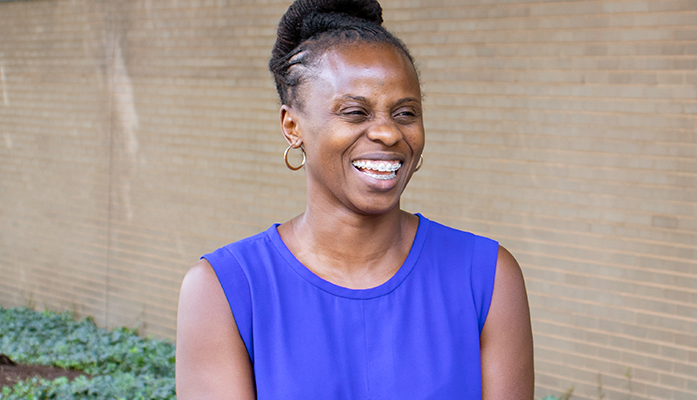
For Akudo Ejelonu (Master of Environmental Studies ‘18/Master of Public Health ’17), a dual degree option at Penn opened a pathway to creating meaningful connections. As a former Penn employee enrolled in the Master of Public Health (MPH) degree, Akudo first encountered Penn’s Master of Environmental Studies (MES) when she took a course on environmental health and something clicked for her. “The environmental studies course really challenged me to think critically about the intersectionality of health, gender, sexuality, and environmental factors,” she reflects. “When I learned that the MES and MPH programs were launching a dual degree for the first time, I knew I wanted to be a part of that,” she adds. “The dual degree program pushed me to ask more questions about how the environment plays a role in health outcomes.”
One question that motivates Akudo’s research is what happens to populations that are displaced by what she calls the new form of migration. “People migrate due to marriage or employment, but the new form of migration that we’re dealing with is environmentally induced, or caused by weather-related disasters,” she explains. “We need to get a better sense of what resources are needed for displaced folks to rebuild their lives—not just their physical needs, but their mental and emotional well-being.”
As she completed the dual degree requirements, Akudo looked for opportunities to enrich her global perspective as well as her multidisciplinary approach. “When I first met with the MES program director, I asked her what classes required travel,” she laughs. As a result, Akudo took a course focused on ecology in Puerto Rico which included a study of the US territory’s political and cultural history, and visited Kolkata in another course to examine social, financial, and mechanical factors that determine the long-term sustainability of sanitation programs. For Akudo, the program’s international opportunities fulfilled her personal goals as well as her environmental interests in connecting local issues to global patterns. “Being from Nigeria and raised in Boston, I had the opportunity to connect my dual identities as an immigrant and as a new US resident,” she says. “It’s important for me to be able to bring my two identities together and also to learn how to do sustainable work that can be implemented whether I’m in Mississippi or Guatemala.”
A former student board member of the Global Water Alliance, an organization of water researchers and engineers, Akudo also values the ability to connect with professionals in different fields. “Although I’m not an engineer, I’m still able to have conversations with engineers, and understand the work they’re doing and how we can work together.” Akudo credits her multidisciplinary perspective to the flexibility of her programs at Penn. “Don't see yourself as a student of the program,” she advises. “See yourself as a student of the whole University. The MES department allowed me to take classes from all across Penn. That's where a lot of resources and opportunities open up, and that's how I've been able to grow.”
To read more about Akudo’s experience in the dual degree program, visit A Global Agent of Change in our MES in the Community section.





